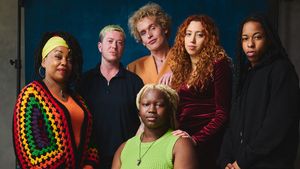Treatment GuideJust DiagnosedSex & DatingAfrican AmericanStigmaAsk the HIV DocPrEP En EspañolNewsVoicesPrint IssueVideoOut 100
CONTACTCAREER OPPORTUNITIESADVERTISE WITH USPRIVACY POLICYPRIVACY PREFERENCESTERMS OF USELEGAL NOTICE
© 2025 Pride Publishing Inc.
All Rights reserved
All Rights reserved
Scroll To Top
By continuing to use our site, you agree to our Privacy Policy and Terms of Use.
[Editor's note: HIV Plus has neither made any investigation into the practices of the Martha's Vineyard Holistic Retreat nor makes any endorsement of the retreat or its practices in the publication of this article.] When Roy Simmons arrived at Martha's Vineyard Holistic Retreat in May 2003, he only vaguely resembled the muscular, 290-pound pro football player who had competed with the Washington Redskins in the Super Bowl in 1984. His weight, though roughly the same, was now more linked with fat than with muscle. He had skin lesions on his back and chest. He barely had enough energy to climb a single flight of stairs at the Vineyard Haven, Mass., clinic. And although he was managing his HIV infection'diagnosed in 1997'through antiretroviral therapy, Simmons's overall health was so visibly poor that a friend of nearly 25 years, Jimmy Hester, who also is HIV-positive, prodded the former National Football League pro to enroll in a 21-day detoxification and lifestyle modification program, which he had recently completed himself. Today, roughly nine months later, Simmons, 47, looks almost nothing like the man who first shuffled into the holistic clinic, says Roni DeLuz, a registered nurse, naturopathic doctor, and founder of the center. He dropped more than 20 pounds during the detoxification program and nearly 60 pounds total. His skin problems have cleared up. And his energy level has risen to the point where he not only exercises daily but also is getting into more heavy workouts, including lifting weights and two- to three-mile runs. DeLuz says Simmons's improved health is not just beneficial to his overall well-being but also helps in his battle against HIV. A less-toxic environment in the body makes it more difficult for HIV to thrive, she says, and it also enables the body to devote less energy toward addressing the harmful effects of the toxins and divert it instead to fighting the disease. But Simmons's healing is not solely physical. He says that over the past year he has grown healthier in mind and spirit as well. Today, Simmons is finally at peace with himself, his homosexuality, and his HIV infection'so much so that he has decided to put himself into the public spotlight to speak on a number of AIDS- and health-related issues, particularly the health regimen he says changed his life. 'It's tough to be so public'I've always been a very private individual'but part of the slow death I was entertaining was about not being honest and straightforward,' Simmons says. 'But when you get something good, you pass it on.' Learning a New Game he 'something good' Simmons has pledged to pass on is largely centered on the holistic lifestyle he adopted at the Martha's Vineyard clinic. For the former football pro, that meant fundamentally changing nearly every aspect of his life'especially what he ate. 'I'm from the South, and I love to eat,' he says. 'Macaroni and cheese, fried chicken, corn bread, opossum, coon'I've eaten all that.' But eating, it turns out, was a very loose concept at the holistic retreat, where for three weeks Simmons was given no solid food at all. Instead, his meals consisted of supplement-laden drinks, herbal teas, vegetable broths, juice made from a mixture of fresh vegetables, and water. 'We use a liquid diet because it works best for detoxifying the body and for colon therapy,' DeLuz says. 'When you detoxify, all your vital organs get a rest so your energy can go toward healing.' An all or mostly liquid and supplements diet is generally safe for HIV-positive adults as long as it provides the recommended daily amounts of necessary nutrients, says Michael Gottlieb, MD, an HIV specialist at Synergy Healthcare Medical Associates in Los Angeles. 'But there can be a danger if it's taken to extremes or involves any lean body mass loss in a patient who is already underweight' or fighting AIDS-related wasting, Gottlieb says. Cade Fields-Gardner, director of the Cutting Edge, a Chicago-area HIV nutrition company, and a columnist for HIV Plus, adds that an extended all-liquid diet that is too low in calories could also create fat-loss problems for those struggling with or at risk for lipodystrophy. This is especially true, she adds, for people with other lipodystrophy risk factors, such as smoking or drinking, a low baseline CD4-cell count, or a high baseline viral load. Oxygenated water is part of the retreat's emphasis on using oxygen to detoxify the body, which is the clinic's primary goal. For HIVers, an oxygenated body can help slow HIV disease progression, according to DeLuz. A 2003 study in the journal ,i>Pathophysiology suggests that oxygen does have health benefits. In addition to promoting feelings of wellness and boosting energy and alertness, oxygen plays a role in helping wounds heal, according the study. Oxygen deficiencies also have been linked with fatigue and poorer immune function. Gottlieb, however, says he is skeptical whether oxygenated products, particularly drops for drinking water, can offer any specific health advantages for HIVers. The Daily Scrimmage or Simmons, the detoxifying meal program at the clinic consisted largely of four key supplements'an antioxidant containing berry concentrates, concentrated vegetable compounds, a liquid supplement to promote bone and joint healing, and aloe vera. Additional supplements included an acidophilus-containing probiotic to replenish bacteria in the gastrointestinal tract, enzyme capsules, antioxidant tablets, and oxygenating powders mixed with water. Another key part of Simmons's diet was a daily 'live juice' made from combinations of vegetables. 'Juicing gives you the maximum nutrition with easy digestion,' DeLuz says. 'It's a way to detoxify, but it's also a way to feed.' Fields-Gardner agrees that juicing does offer nutritional benefits. 'Someone who doesn't eat a lot of fruits or vegetables,' she says, 'tends to get a more concentrated amount of nutrients if they juice them.' Detoxification during the clinic regimen also was completed through exercise, colon therapy (commonly called a colonic or colon hydrotherapy), ear coning (a process to remove pollutants and toxins from the inner ear), and sauna sessions, Simmons says. An intravenous infusion of vitamins, tailored to the specific nutritional and health needs of each clinic patient, is also offered at the end of the 21-week session. After three weeks at the holistic center Simmons had shed 20 pounds; Hester, 21. Both say they had increased energy, heightened mental clarity, and an overall healthy feeling that was so visibly apparent that Hester's HIV doctor decided to go through the program himself. 'I've seen a lot of clinical progress in him,' says Alberto Martinez, MD, who practices in the El Paso, Tex., suburb of Ciudad Ju'rez, Mexico. Martinez says he is considering having his future HIV patients go through the same sort of process before he begins antiretroviral therapy for them. Gottlieb also sees no reason why HIV-positive people should not adopt a holistic health regimen if they choose to'as long as the program provides adequate nutrition. But he cautions that it should not be a substitute for medical treatment of HIV disease'which can also boost overall healthy feelings by suppressing virus in the body, he says. 'You should never substitute a holistic regimen for [highly active antiretroviral therapy],' he notes. Simmons will not reveal whether he is on a HAART regimen or not because he says he does not want to give the impression that he is dispensing medical advice. Striving for Game Condition oday, several months after attending the retreat, Simmons has merged traditional health care with the holistic regimens he learned at the clinic. Both he and Hester take supplements as well as a protein shake and live juice each day. Their meals consist of salads, steamed vegetables, grilled or baked fish, brown rice, and other healthful choices. Red meat, alcohol, drugs, and coffee are avoided. Exercise continues to be important too. The exercise and diet regimen can be tough, particularly for two self-proclaimed sugar and carbohydrate addicts, Simmons says. But it is not inflexible and does allow some room for variation'or what DeLuz calls 'recreational eating.' Simmons and Hester say they are compliant with the program about 85% of the time, which is a level DeLuz says is sufficient, but they sometimes find the occasional doughnut, slice of pizza, or plate of pasta too hard to resist. 'But I realize it does absolutely nothing for me,' Hester says. 'I'm aware more than ever that it's not serving my body at all, so I'll get back on it.' In addition to the cravings, the health regimen also comes with significant costs. The 21-day detoxification program carries roughly a $10,000 price tag; shorter stays range from $450 for a two-night retreat to $4,200 for a two-week wellness program. Simmons and Hester now spend $150 a month or more on supplements from the holistic center. Additional vitamins, supplements, and procedures like colonics, and vitamin drips boost the costs significantly higher. Hester is adamant, though, that the program is worth the money and that savings in other areas achieved through lifestyle changes easily help make up for the added costs. 'Don't get fast food. Instead,' he says, 'change your diet and get the supplements.' Seeing the Entire Field hile cleansing and nourishing the body is perhaps the overriding concern at the retreat, another target for clients is stress reduction. 'Stress is a toxin,' DeLuz says simply. Scientific studies have shown, Gottlieb points out, that stress and other emotional and mental health problems can lead to faster disease progression [see 'Is Every Day a Rainy Day?' HIV Plus, July 2003]. Depression has been linked with quicker onset of AIDS-related complications, and animal studies show stress to be associated with higher rates illnesses and death. As it turns out, stress has been almost omnipresent in Simmons's life. The former Super Bowler has struggled with self-doubt and destructive feelings, he says, from the time he was raped as an 11-year-old, through three periods of alcohol and drug addiction (the last two following his HIV diagnosis), to the years hiding his sexuality while growing up in the conservative South and playing football in the ultramasculine NFL. He says he even contemplated suicide at one point. Simmons, nicknamed 'Sugarbear' while a student athlete at Georgia Tech University, also lived much of his adult life on the 'down low,' having numerous relationships with women, including fathering a daughter with his high school sweetheart, while secretly having sex'often unprotected sex'with men. It was a secret he closely guarded throughout his pro sports career. 'I'm a human being, and the guilt, the lies, the deception basically took its toll on my mind and spirit,' he says. For Simmons, announcing publicly that he is gay, which he did during a 1992 Donahue episode, and speaking about being HIV-positive for the first time during World AIDS Day, 2003, have been so emotionally freeing that he plans to regularly talk about his health regimen, safer sex and HIV prevention, and the dangers of the down-low life. 'Be honest,' he urges. 'Stop spreading the disease. Have safe sex. Love yourself. Love yourself enough to not mistake passion for love and enough to protect yourself. Love yourself enough to want to live.' And today, perhaps more so than during any other part of his life, Simmons proclaims he does want to live. 'The future holds good things for me,' he nearly croons. 'I'm clear. I have a clear conscience. Freedom fuels health. So now I want to pass on what I've learned over the past months to others. I hope to be a voice to help individuals stop running from themselves and embrace and love themselves.'
From our Sponsors
Most Popular
Lexi Love comes out as HIV+ after Trump deletes federal resources
January 23 2025 11:23 AM
Grindr is reminding us why jockstraps are so sexy and iconic
May 02 2025 5:36 PM
BREAKING NEWS: Trump admin moves to end federal HIV prevention programs
March 18 2025 6:10 PM
Trump's orders prompt CDC to erase HIV resources
January 31 2025 5:29 PM
Celebrating Black History Month with our annual African American issue
February 01 2025 3:28 PM
Tyler TerMeer vows to continue to fight for health care for all
January 28 2025 3:00 PM
Discover the power of Wellness in your life
March 26 2025 12:41 PM
Plus: Featured Video
Latest Stories
Dancer. Healer. Survivor. DéShaun Armbrister is all of the above
July 02 2025 8:23 PM
Two right-wing Supreme Court justices signal they may uphold access to PrEP and more
April 21 2025 4:10 PM
Broadway's best raise over $1 million for LGBTQ+ and HIV causes
April 03 2025 7:15 PM
Plus nominated for 2025 GLAAD Media Award
January 22 2025 12:42 PM
'RuPaul's Drag Race' star Trinity K Bonet quietly comes out trans
December 15 2024 6:27 PM
AIDS Memorial Quilt displayed at White House for the first time
December 02 2024 1:21 PM
BREAKING: Supreme Court rules to save free access to preventive care, including PrEP
June 27 2025 10:32 AM
1985: the year the AIDS crisis finally broke through the silence
June 26 2025 11:24 AM
Trump admin guts $258 million in funding for HIV vaccine research
June 03 2025 3:47 PM
500,000 Children at Risk: PEPFAR Funding Crisis
April 08 2025 3:51 PM
The Talk Season 5 premieres this spring with HIV guidance for the newly diagnosed
March 26 2025 1:00 PM
Jess King is here to help you live your happiest, healthiest life yet
March 24 2025 4:35 PM
A camp for HIV-positive kids is for sale. Here's why its founder is celebrating
January 02 2025 12:21 PM
VIDEO: A man living with HIV discusses his journey to fatherhood
June 10 2025 4:58 PM
HRC holds 'die-in' to protest Trump health care cuts
April 28 2025 2:11 PM
Season 4 of The Switch on resilience & radical self-love returns this spring
March 26 2025 12:20 PM
Gerald Garth is keeping people of color happy and healthy through trying times
March 11 2025 3:38 PM
This long-term HIV survivor says testosterone therapy helped save his life.
December 16 2024 8:00 PM
Ricky Martin delivers showstopping performance for 2024 World AIDS Day
December 05 2024 12:08 PM













































































